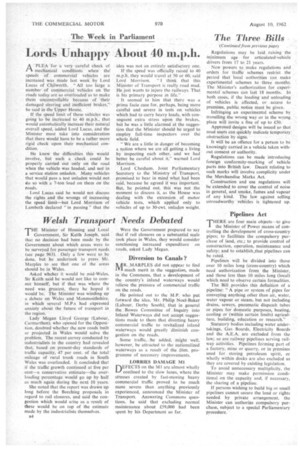Pipelines Act
Page 38

If you've noticed an error in this article please click here to report it so we can fix it.
'THERE are four main objects—to give 1 the Minister of Power means of controlling the development of cross-country pipes; to facilitate the compulsory purchase of land, etc.; to provide control of construction, operation, maintenance and safety; and to establiskthat pipelines can be rated.
Pipelines will be divided into those over 10 miles long (cross-country) which need authorization from the Minister, and those less than 10 miles. long (local) which need to observe certain formalities.
The Bill provides this definition of a pipeline: "A pipe or system of pipes for conveying anything other than air, water, water vapour or steam, but not including drains, sewers, pneumatic dispatch tubes or pipes for domestic purposes, heating, cooling or (within certain limits) agriculture, building, education or research."
Statutory bodies including water undertakings, Gas Boards, Electricity Boards and the A.E.A. are excluded from the law; so are railway pipelines serving railway activities. Pipelines forming part of a factory, mine or quarry, or in premises used for storing petroleum spirit, or wholly within docks are also excluded as they are covered by existing legislation.
To avoid unnecessary multiplicity, the Minister may make permission conditional on the capacity and, if necessary, the sharing of a pipeline.
If persons wishing to build big or small pipelines cannot secure the land or rights needed by private arrangement, the Minister can authorize compulsory purchase, subject to a special Parliamentary procedure.
















































































































